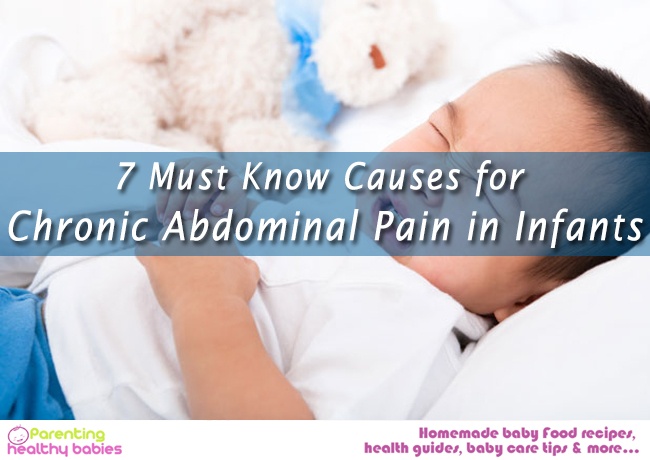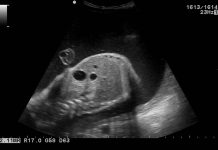If your baby seems to be unusually nagging today, it may well be having an abdominal pain. It may start after a feeding or may appear suddenly, but it is painful and very uncomfortable for the baby. It may also have other symptoms like fever, vomiting, diarrhea etc depending on the precipitating factors. Chronic abdominal pain is a common disorder in children, especially infants.
Read More: 11 Home Remedies to Treat Anal Fissures in Kids
Causes for Chronic Abdominal Pain in Infants
Most often the pain is resolved after treatment, but when it does not resolve over time, parents are hard pressed for extensive testing and treatment. In fact, pediatricians themselves perceive chronic abdominal pain as a time consuming disorder that is also sometimes resistant to different therapies. So discuss the symptoms with your baby’s doctor to help him figure out the problem. Let’s discuss some common reasons for abdominal pain which may help you to prevent it to some extent.
1} Colic
This is a classic diagnosis for abdominal pain, especially if the baby is younger than 5 months. The baby may cry uncontrollably and inconsolably for hours at a stretch and for days and weeks. It may also pass a lot of gas. Though the reason for such pain is not yet pinpointed, pediatricians consider it to be a result of painful contractions of the intestine. It is generally observed that the pain and discomfort of colic pain becomes intense in late afternoons and early evenings. It is a fact that there’s no cure for colic. But it is also a fact that these symptoms mostly improve significantly after 4 months, and 5 months old babies are generally free of this malaise.
Read More: 11 Natural Remedies for Calming a Colic Baby
2} Constipation
It may well be the most common cause for abdominal pain in infants and babies. This is most common at an age when the baby has just started eating solids. Babies at this age usually have a bowel movement every day or at least once in two or at least once in three to four days. If your baby has not had any in the last three or more days it may be constipated and would feel very uncomfortable when it would have the urge for bowel movement. When it is ultimately able to pass stool it will pass dry, hard stools which are difficult to pass. To prevent constipation you can give her foods that help to produce loose stools and cut down on foods that may lead to firmer stools like apples, bananas, rice, carrots, etc. Also make the baby drink a lot of fluid.
Read More: 15 Foods that Causes Infant Constipation
3} Gas pain
Abdominal pain due to formation of gas is also common in babies. This problem too is seen in those who have just started eating solids. An underdeveloped colony of bacteria in the baby’s digestive tract may also be responsible for gas formation. However, you can effectively minimize the discomfort feeling of your baby if you can make him burp frequently. To make him burp keep him upright and give him gentle belly rubs. Also try to place him on your knees flat on its abdomen and give a rub on his back. It may burp and release the gas. Also there are anti-flatulent droops available in drug stores.
Read More: 14 Home Remedies for Gaseousness and Farting in Babies
4} Reflux
Babies sometimes vomit after a feeding. This is also known as gastro esophageal reflux which is normal in infants as well as adults. This happens due to reflux of acid and food from stomach to esophagus when the valve between the two is malfunctioning. Acid can gurgle up from the stomach into the throat and cause irritation and heart burn in babies too. It is often a result of an upset stomach. However, babies usually outgrow this problem in its first year. Talk to the doctor for remedies.
Read More: 11 Natural Ways to Treat Acid Reflux in Infants
5} Stomach flu
If the baby is vomiting or suffering from diarrhea then it may well be having a stomach flu. It is a very common baby problem and is counted among the top two most common illnesses among babies in in United States. Your baby may even have a loss of appetite and fever. Diarrhea can lead to dehydration too. So the immediate step is to feed him plenty of fluids so that he does not suffer from dehydration. Consult the doctor for remedies.
Read More: 11 Home Remedies to Treat Stomach Flu in Children
6} Common infections
Some common infections like cold and flu can also cause abdominal pain in babies. This may be because of the mucus from upper respiratory illnesses dripping down the throat into the stomach and irritating it. The infant may vomit to clear it and the pain may go away after some time. If it does not, consult the doctor.
Read More: Painful versus Painless Vaccinations: Facts
7} Food or milk allergy
Food or milk allergies in baby can also cause vomiting, diarrhea and abdominal pain. If the infant is allergic to a particular food, it’s immune system may overreact to it and cause allergy symptoms that may well include chronic abdominal pain. The best way is to identify the allergen. If you are unable to identify an allergen, allergy test needs to be carried out.
References
https://www.ncbi.nlm.nih.gov/pmc/articles/PMC1867894/
http://pediatrics.aappublications.org/content/115/3/812













